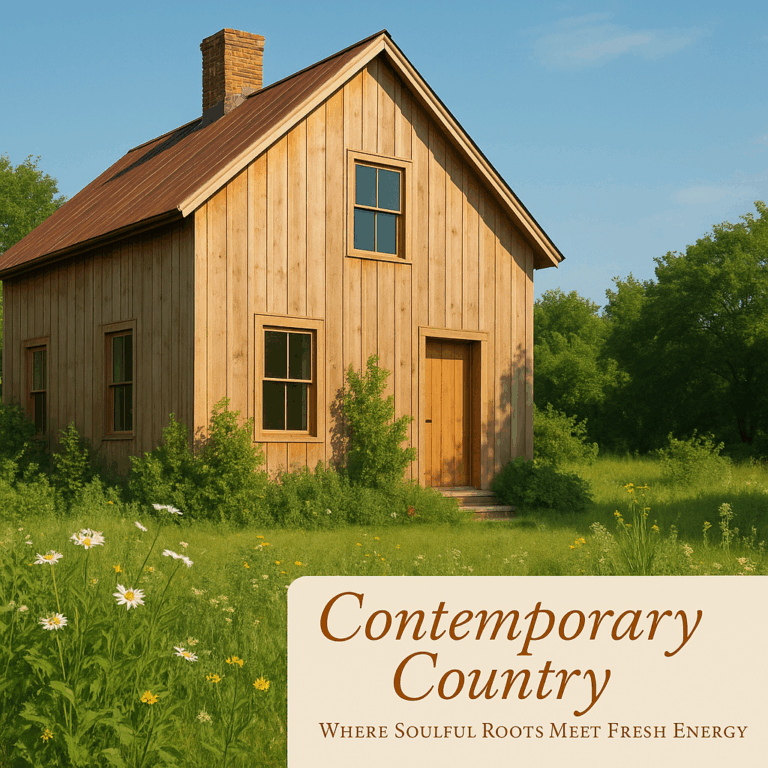The Soulful Roots of Contemporary Country
Country music has always been a heartfelt thread woven into the fabric of American music, telling stories of love, loss, hope, and the rugged beauty of everyday life. Contemporary country, a vibrant branch of this timeless tradition, pulses with fresh energy while honoring the rich roots from which it grew. Born out of the crossroads where classic country intersects with pop sensibilities, contemporary country has rewritten the rules without losing sight of the emotional core that first drew listeners to the genre. This is a genre alive with passion, storytelling, and the unmistakable twang of steel guitars echoing both nostalgia and modern rhythm.
Historical Context: From Honky Tonks to the Neon Spotlight
To understand contemporary country, one must first revisit its lineage. Classic country music emerged in the early 20th century from the folk songs and ballads brought by immigrants to the southern United States. By the 1940s and 50s, legends like Hank Williams and Patsy Cline filled roadside honky tonks with mournful ditties and toe-tapping anthems. These songs, stripped down and raw, spoke candidly about heartache, faith, and the daily grind.
Fast forward to the 1980s and 90s, a period of significant transformation. Artists like Garth Brooks and Shania Twain began to blend traditional country instrumentation with arena rock dynamics and pop melodies, birthing what we now embrace as contemporary country. The Nashville sound evolved, embracing electric guitars alongside fiddles and pedal steel, introducing synths and drum machines to craft an upbeat, radio-friendly style that expanded country’s audience far beyond its rural roots.
Genre Description: Where Tradition Meets Today

At its core, contemporary country is an exquisite balancing act between reverence for heritage and an appetite for innovation. It retains the storytelling and emotive vocals that define country music while weaving in the polished production and catchy hooks characteristic of pop. The genre’s palette features steel guitars, banjos, and fiddles, but it doesn’t shy away from dynamic beats and layered harmonies. Lyrics explore timeless themes—small-town love, family bonds, and the struggles of life—but often with a modern twist, addressing contemporary issues and diverse experiences.
Contemporary country invites listeners into the warmth of a shared human experience, one that’s as relatable today as it was when Johnny Cash sang about life’s hardships. The genre’s accessibility has helped it cross cultural boundaries and chart new territories internationally, as its relatable tales resonate with a wide spectrum of fans, bridging generations through song.
Key Artists: Voices That Define the Genre
In the sprawling landscape of contemporary country, a constellation of artists shine brightly, each bringing their unique voice and style.
Carrie Underwood, with her powerhouse vocals and storytelling finesse, stands as a beacon of modern country’s emotive power. Her album *Carnival Ride* and songs like “Before He Cheats” brought country music to mainstream audiences with unapologetic strength and vulnerability. Underwood’s ability to channel both fire and tenderness reminds us why country music endures as a genre that speaks frankly to the soul.
Keith Urban, the Australian-born virtuoso, bridges the gap between pop intricacy and country’s rustic heart. His guitar work and heartfelt lyrics in albums like *Golden Road* underscore the genre’s adaptability and global reach. Urban’s flair for melody and emotional honesty exemplifies the genre’s evolution without losing authenticity.
Then there’s Kacey Musgraves, a sparkling new voice in contemporary country, whose album *Golden Hour* won critical and commercial acclaim. Musgraves infuses traditional storytelling with progressive themes and dreamy soundscapes that push the genre’s boundaries. Her nuanced lyricism and soothing tones weave modern life’s complexities with the classic country spirit, crafting songs that linger in the listener’s mind long after the music stops.
Notable Songs and Albums: Soundtracks to Life’s Stories
Certain songs become pillars within the genre, echoing deeply across hearts and decades. Blake Shelton’s “God’s Country” is an anthem with earthy grit and spiritual fervor, melding raw, muscular instrumentation with a patriotic soul that resonates fiercely with listeners. It’s a stirring example of contemporary country’s power to unite and inspire.
Taylor Swift’s *Fearless* marked a watershed moment, blending country roots with pop polish in a way that transformed both genres. Tracks like “Love Story” told universal tales with youthful optimism infused into country’s narrative tradition. Swift’s ascent sparked a flood of crossover appeal that redefined what contemporary country could encompass.
Chris Stapleton’s *Traveller* tore through genre barriers with its gritty, soulful voice and rootsy instrumentation. Stapleton’s blend of blues, country, and southern rock embodied the genre’s essence: storytelling steeped in raw emotion and musical depth. Snippets of heartbreak, redemption, and life’s quiet triumphs paint vivid snapshots that feel personal and profoundly universal.
Lasting Effects: The Ever-Growing Influence
Contemporary country music is more than a genre; it’s an evolving cultural force that continues to shape American music and beyond. It nurtures a continuum where tradition meets innovation, preserving country’s storytelling heritage while illuminating it with new perspectives and sounds. The genre’s immense popularity has expanded music festivals and television programming dedicated to country music, making it one of the most commercially significant forms in the industry today.
Moreover, contemporary country serves as a bridge connecting urban and rural narratives, diverse voices, and shared human emotions. It has widened the lens through which country music is perceived, showing the world that its stories are alive, breathing, and becoming ever more inclusive. The genre’s impact also echoes in fashion, language, and even social conversations, highlighting the intertwined nature of music and culture.
Music historian Bill Malone once reflected, “Country music is the art of telling a story in song.” Contemporary country honors that art with renewed vigor—each chord struck and lyric sung is a tribute to moments felt deeply, places remembered, and the enduring power of song to heal and uplift. It is a living testament to American music’s heart, one that continues to beat strong, vivid, and full of life.